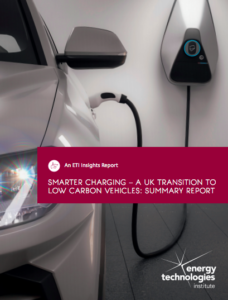 Without adequate smart charging incentives and policy, electric vehicles will save substantially less CO2 because drivers will naturally charge during evening peaks, when demand – and carbon intensity – is highest, according to a new report.
Without adequate smart charging incentives and policy, electric vehicles will save substantially less CO2 because drivers will naturally charge during evening peaks, when demand – and carbon intensity – is highest, according to a new report.
Meanwhile, if drivers all respond to the same price signals at the same time, a new ‘super peak’ could emerge, creating more problems for the UK energy system, according to The Energy Technologies Institute.
The ETI analysed driving and charging patterns from 248 electric vehicles and plug-in hybrids. It said data “supports the view that without intervention EVs would naturally and predominantly charge in the early evening”.
While the UK power generation fleet is decarbonising, CO2 intensity differs throughout the day and is highest during the evening peak, when gas – and some coal – ramps up.
According to the report, UK fleet average carbon savings from switching from today’s fleet to vehicles running on low carbon electricity would be around 1.5 tCO2e per vehicle per year.
But meeting demand from cars charging in the evening peak would likely require additional gas back-up plant firing up. That “might reduce the savings to as little as 0.2-0.4 tCO2e per vehicle per year”, states the report.
As such, “the UK needs a strategy to provide enough capacity, with enough intelligence to meet drivers’ needs, while avoiding risks to the electricity infrastructure or additional investment in high-carbon peak generating capacity,” said the ETI. “This will involve the electricity and vehicle industries working with different tiers of government.”
Co-ordinate smart charging…
However, smart charging standards must be co-ordinated as disparity and volumes of vehicles that can’t use them will backfire, denting consumer confidence, the report suggests.
The ETI also called for more trials of mass market smart charging. These could be left to the private sector, it suggested, but the value of smart charging to the UK and the wider energy system suggests “a set of trials with outputs that are more openly available” would probably be better.
…Or risk new super peak
The data studied suggest that using time of use tariffs to manage charging “resulted in charging coalescing at the start of the cheapest period of the tariff”, states the report. “This poses a system level risk at high levels of EV uptake where a new super-peak could emerge.”
However, drivers involved in the study were also receptive to other smart approaches – such as stating when they needed the car, how full they wanted the battery and leaving the management to a third party.
Drivers that had experience of both approaches were more likely to chose the latter, said the ETI. “This suggests there is the potential for a more intelligent form of managed charging to gain traction and deliver greater savings across the energy system, ultimately lowering electricity costs for all electricity consumers.”
Incentivise electric miles, not cars
The report states that plug-in hybrids and pure battery power cars are complimentary technologies rather than competitive. However, because plug-in hybrids may do few miles electrically, it recommends incentivising electric miles rather than the cars themselves – both for private owners and fleets. For the latter, taxation support for fleets that deliver targets for fuel use per mile and use of electricity should be considered, recommends the ETI. That could work in tandem with minimum standards: Once vehicles in a fleet meet the minimum standard (e.g. electric range for hybrids), the whole fleet becomes eligible for tax benefits, with HMRC auditing milage reports.
Download the report summary here.
Related stories:
Eon: Smart approach to charging is critical
Business outline incentives needed to boost EV infrastructure
Kaluza: EVs can displace large scale battery storage
Calling all fleet operators: Free vehicle-to-grid charging infrastructure
Vehicle-to-grid study suggests £400 annual revenue per electric vehicle
Nissan: 2019 a “breakthrough year” for vehicle-to-grid
Electric vehicles: Define smart charging, urge DNOs
Vehicle-to-grid: Are we nearly there yet?
EV boom no sweat, says National Grid
Flexitricity chief: UK has enough spare power electrify every car on the road
Follow us at @EnergystMedia. For regular bulletins, sign up for the free newsletter.



